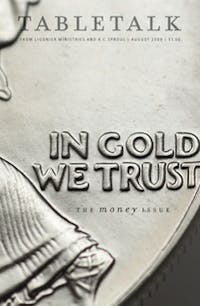
Request your free, three-month trial to Tabletalk magazine. You’ll receive the print issue monthly and gain immediate digital access to decades of archives. This trial is risk-free. No credit card required.
Try Tabletalk NowAlready receive Tabletalk magazine every month?
Verify your email address to gain unlimited access.
I’m connected to royalty. Granted, it’s a rather thin point of union. In less than six degrees, though through enough marriage links that there is no legal tie, I am connected with the king of the tropical island, Yap. Yap is best known not for its sandy beaches nor its pineapple harvest, but for its money. They do not traffic there in sea shells. Neither is their money pure gold. Instead their coinage is great wheel-shaped stones that are hollow in the middle, some as tall as a coconut tree. What can we learn from this about the people of Yap? First, that they are not given to hasty exchanges. It takes a commitment to trade goods and services for stones. As cumbersome as barter can be, it’s likely more easy than rolling a ton of rock down to the local bank. Second, while neither thieves nor robbers are apt to make off with the booty, it is likewise likely that there isn’t a great deal of foreign trade. That is, not many outside of Yap would want this money.
You can discern a great deal about a given people by studying their money. These United States, for roughly three fourths of our history, used gold for money. And we prospered like no other country before us. Granted, as the years went on, the connection between paper dollars and the gold that was supposed to be behind them grew more and more tenuous. Nevertheless, we used to be able to say that this thing or that was “solid as a dollar.” What we meant was that it was as solid as the gold behind a dollar. It could be counted on.
It was Nixon who fully and finally made the greenback truly a green back, that is, backed only by the ink with which it was printed. Since that time, our money has been as dishonest and unstable as we are. Now our money is debt backed by debt. Federal Reserve notes are not worth the paper they’re printed on. In more recent years we’ve gone high tech in our dishonesty. Paper “money” represents a tiny portion of the “money” we use every day. Instead our money today consists in the ethereal world of cyberspace as a simple collection of zeroes and ones, all of which in the end is worth nothing but zeroes.
In a perverse way, our folly makes perfect sense. That is, our understanding of wealth and money matches up nicely with how we view the whole universe. We live in a culture that believes it lives in a universe that just popped into existence. Why should not the god of our age, the state, pop more wealth into existence? If everything came from nothing, why not just make more? The tables turn on us, however, when we realize that’s exactly what we have — nothing — and mountains of it.
We in the church have drunk too deep of the “wisdom” of the world. We not only join in the feeding frenzy at the trough of the nanny state, but we spend our hours bickering over this or that policy proposal. If we are Democrats, then we hate the previous president who created money from nothing. If we are Republicans, we hate the current president for doing the same. We watch the headlines, putting our fingers to the wind, and sell each other on sundry schemes for profiting on the coming economic meltdown.
What we’re supposed to be doing, however, is seeking first the kingdom of God and His righteousness. What we’re supposed to be doing is simple enough — we’re supposed to be working. We’re supposed to be faithfully exercising dominion, bringing all things under subjection, ruling over all things. We’re not supposed to chase lying money but to do honest work. The wisest man, outside of our Lord, who ever lived told us: “Go, eat your bread with joy, and drink your wine with a merry heart, for God has already approved what you do. Let your garments always be white. Let not oil be lacking on your head. Enjoy life with the wife whom you love” (Eccl. 9:7–9a). This is honest living.
There is nothing new under the sun. The world around us, as it always does, is self-destructing. It is has built its culture on sand. And as the foundations of the city of man begin to crack, our hearts are troubled because we have forgotten where our citizenship lies. By all means we ought to pray for the peace of Babylon. By all means we ought to be a prophetic voice to the world around us. But, in the end, we do all of this from a position of peace. We are not only a people of unfathomable wealth but are immutably so. Our treasure is in heaven where it cannot be devalued. We have been given the pearl of great price, which is worth more than all the wealth in the world, whether it be measured by round, hollow stones or by trillions of dollars. Our wealth is not backed by the Federal Reserve. It is not backed by gold. Our currency is the Rock of Offense.
We are all connected to royalty, immediately. We are the bride of the King. His kingdom knows no end. And we reign with Him, seated in the heavenly realms.
